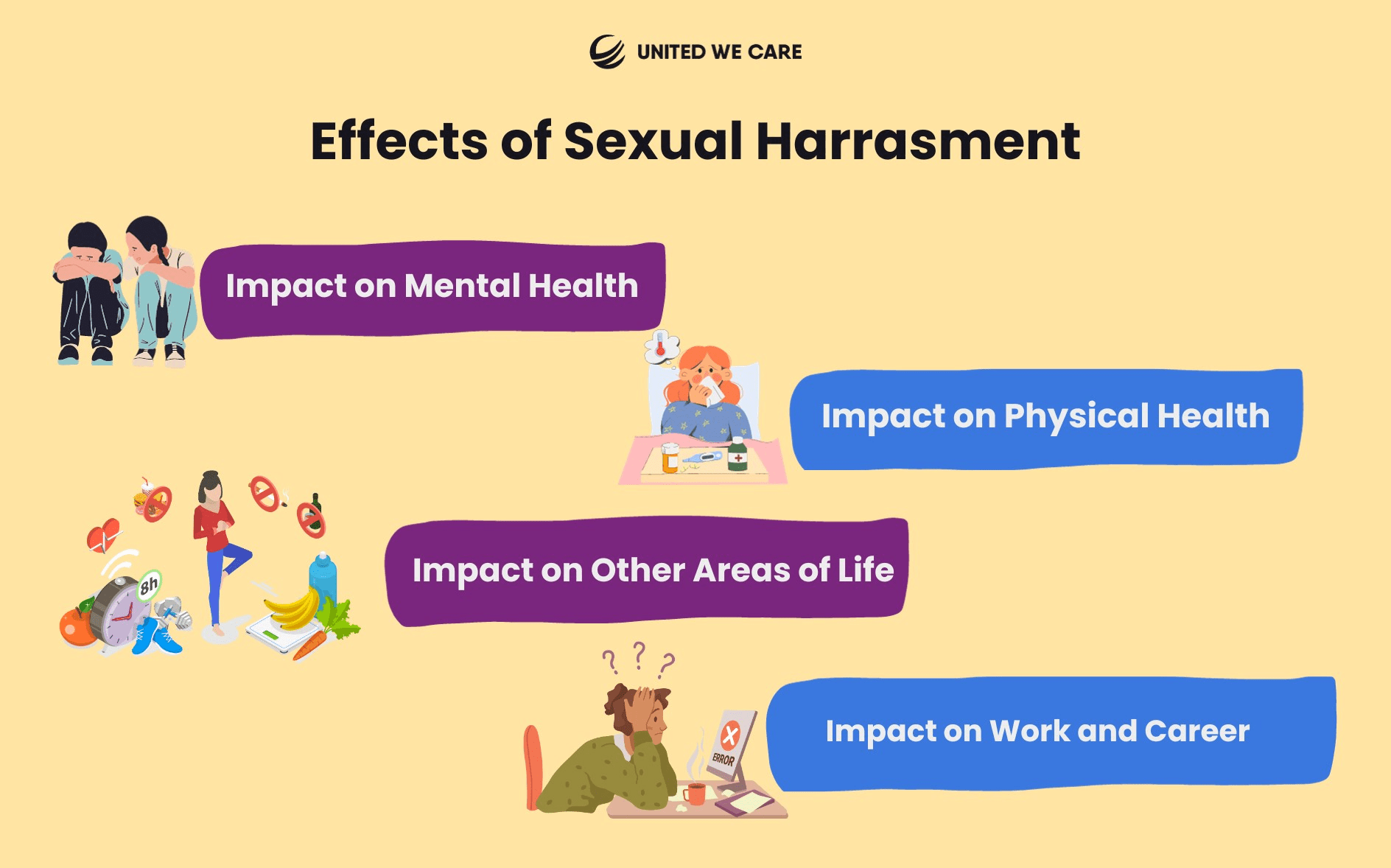Introduction
You might remember Monica from the popular sitcom F.R.I.E.N.D.S and the episode where she is on a job interview, and the manager asks her to make a salad. The manager who asks her this seems to find it sexually arousing, and even though the show captures this as a “funny moment,” the discomfort and disgust are clear on Monica’s face. This, in fact, is an incident of sexual harassment. Media might have used these instances as jokes, and F.R.I.E.N.D.S is certainly not the only TV show to do so. In reality, it is a difficult and, at times, even a traumatic experience. When you go through something like this, you feel a range of emotions, including fear, guilt, shame, and rage, and at times do not understand what is actually happening. Sexual harassment is a sensitive topic, and this article covers all there is to know about it.
TW: Mention of sexual violence, rape, and assault.
What is Sexual Harassment?
Sexual Harassment is any unwanted sexual advances, requests, or verbal or physical harassment of a sexual nature [1]. Although many define harassment in the context of the workplace and talk about how it can affect the victim’s work, sexual harassment is common outside work as well. Catcalling and comments on the road, using gendered insults, cracking jokes that are sexual in nature, and attempting to touch or hug without consent are all instances of sexual harassment. In fact, in the past few years, sexual harassment in cyberspace has also become a common occurrence.
Sexual harassment is one form of sexual violence. A more extreme and dangerous form is sexual assault, where the perpetrator touches, gropes, uses physical force, or rapes the victim. Organizations and authors now understand this phenomenon with the concept of a continuum of harm where at one end are more subtle forms of harassment behaviors (like jokes or innuendos), and in the middle are more explicit forms of harassment (like inappropriate advances, verbal harassment, threats, or requests) and in the other end are behaviors that law defines as assault [2].
Many people assume that only women can be subject to sexual violence. However, in reality, any individual of any gender orientation and sexual identity can be subject to sexual harassment and violence. In fact, according to some studies, transgender/non-binary individuals report more sexual harassment and assault than men and women [3].
More information about-Understanding and recover from rape trauma syndrome
What does Sexual Harassment Look Like?
Even today, people consider sexual harassment to be a part of what life is. In many countries, when women (cis or trans) walk down the road, they are somewhat alert and prepared for harassment. At workplaces, sexual jokes might run in the group, and if anyone is uncomfortable, it becomes that person’s fault. Sexual harassment can be explicit, but many times, it is subtle. Some behaviors that are a part of sexual harassment are [4]:
- Gender Harassment: A common tactic of harassment includes passing sexist comments or behavior that is based on attitudes about men or women. For instance, passing comments, jokes, vulgar actions, staring, leering, whistling, remarks, insults, or even compliments that are gendered, invading personal space “by mistake,” etc.
- Seductive Behavior: A more direct form of harassment can be repeated invitations to sex, letters, calls, or messages for dates, sharing explicit information, asking for explicit information, etc.
- Sexual Coercion: This involves the perpetrator threatening the victim with some form of direct or indirect punishment if they refuse sexual advances or reward them for accepting sexual advances and, for instance, withholding promotion, negative evaluations, blackmailing, etc.
- Sexual Imposition: This comes in the category of assault and is the easiest to identify: forceful touching, groping, feeling, and direct assault.
There are many behaviors that can come under sexual harassment. Often, the victims are “gaslighted” and told that they are misinterpreting the behavior or creating a scene. However, if something makes you uncomfortable, it is important to discuss this with a trusted individual and, if needed, report that behavior.
Is Sexual Harassment a Crime?
The thing to note before answering this question is that sexual harassment is rampant and present everywhere. According to some global statistics, 35% of women across the world have experienced some form of sexual violence. These statistics become graver. In Asian countries, 57-87% of women have acknowledged the experience of sexual harassment, whereas in the US, 65% of women reported street harassment [5]. In another national survey of the US in 2018, 81% of women and 43% of men reported some form of sexual harassment or assault [6].
With such staggering numbers, most countries have recognized that sexual harassment is an ongoing problem. However, the legal definition and punishment vary within countries, and there is no global law. For instance, in China, there are local but no national laws for harassment. In India, specific laws describe sexual harassment, but many criticize them for being biased toward women. On the other hand, in Canada, there are strict laws that define sexual harassment as a human rights infringement [7].
While many countries recognize sexual harassment as a crime, there is still a hidden problem wherein the crime goes unreported. Many women face retaliation and threats when they wish to report the crime [8]. At times, the authorities invalidate their complaints, and many times, the perpetrator goes unpunished despite reporting.
Must Read-Laws against sexual harassment in the workplace
What are the Effects of Sexual Harassment?

The effects of sexual harassment on a person are devastating. Some common effects of sexual harassment are [1] [4] [9]:
- Impact on Mental Health: When someone sexually harasses a person, the victim experiences a number of negative emotions such as fear, anger, shame, insecurity, or confusion. Eventually, this can turn into issues like chronic stress, anxiety, depression, and even PTSD.
- Impact on Physical Health: People also experience negative impacts on physical health. Victims become more prone to long-term physical health issues and experience symptoms like headaches, pains, sleep disturbance, weight fluctuations, and sexual problems. They may also be more prone to accidents and injuries.
- Impact on Work and Career: Especially when harassment is happening in academics or the workplace, the impact on productivity, satisfaction with work, and absenteeism is high. This can also lead to forced job changes, breaks in career, loss of job or promotion, and severe economic impacts for the victim and their family.
- Impact on Other Areas of Life: The impact of harassment is also social. At times, there is lowered trust in people around, in organizations, and law. The person might also feel isolated from friends and family and, at times, be actually ostracised for speaking up. The person may also face defamation or the subject of gossip, which further lowers their physical and mental health.
Conclusion
It is unfortunate, but sexual harassment is common across the world. But one thing that everyone must be mindful of at all times is that it is not the victim’s fault, and wherever it happens, it is wrong. As a living being, you have rights, and you can report the perpetrator. It is best first to find out what the laws are and share the incident with trusted people to gather support. Sexual harassment can affect your mental and physical health negatively. If you notice something like this, do not hesitate to contact healthcare providers. Just calling and talking to gain information might be helpful.
If you would like to know more about sexual harassment or share your experience with a trusted and knowledgeable expert, you can contact our psychologists at United We Care. At United We Care, we are committed to providing you with the best solutions for your overall well-being.
References
[1] E. Shaw and C. Hess, “Sexual harassment and assault at work: Understanding the costs,” Institute for Women Policy Research, https://iwpr.org/wp-content/uploads/2020/09/IWPR-sexual-harassment-brief_FINAL.pdf (accessed Sep. 25, 2023).
[2] H. N. O’Reilly, “Sexual harassment and sexual assault: What is the connection?” Military Health System, https://www.health.mil/Military-Health-Topics/Centers-of-Excellence/Psychological-Health-Center-of-Excellence/Clinicians-Corner-Blog/Sexual-Harassment-and-Sexual-Assault-What-is-the-Connection (accessed Sep. 25, 2023).
[3] A. Martin-Storey et al., “Sexual violence on campus: Differences across gender and sexual minority status,” Journal of Adolescent Health, vol. 62, no. 6, pp. 701–707, 2018. doi:10.1016/j.jadohealth.2017.12.013
[4] “Effects of sexual harassment – the University of South Florida,” University of South Florida, https://www.usf.edu/student-affairs/victim-advocacy/types-of-crimes/sexualharassment.pdf (accessed Sep. 25, 2023).
[5] M. Senthilingam, “Sexual harassment: How it stands around the Globe,” CNN, https://edition.cnn.com/2017/11/25/health/sexual-harassment-violence-abuse-global-levels/index.html (accessed Sep. 25, 2023).
[6] “2018 study on sexual harassment and assault,” Stop Street Harassment, https://stopstreetharassment.org/our-work/nationalstudy/2018-national-sexual-abuse-report/ (accessed Sep. 25, 2023).
[7] A. Y. Sai, “Comparative study of prevention of sexual harassment laws/regulations in India, China and Canada,” Legal Service India – Law, Lawyers and Legal Resources, https://www.legalserviceindia.com/legal/article-3891-comparative-study-of-prevention-of-sexual-harassment-laws-regulations-in-india-china-and-canada.html (accessed Sep. 25, 2023).
[8] G. Dahl and M. Knepper, Why is workplace sexual harassment underreported? The value of outside options amid the threat of retaliation, 2021. doi:10.3386/w29248
[9] “Effects of sexual harassment and often accompanying retaliation,” Whatishumanresource.com, https://www.whatishumanresource.com/effects-of-sexual-harassment-and-the-often-accompanying-retaliation (accessed Sep. 25, 2023).










